Unease mixes with excitement as Pyeongchang awaits the world
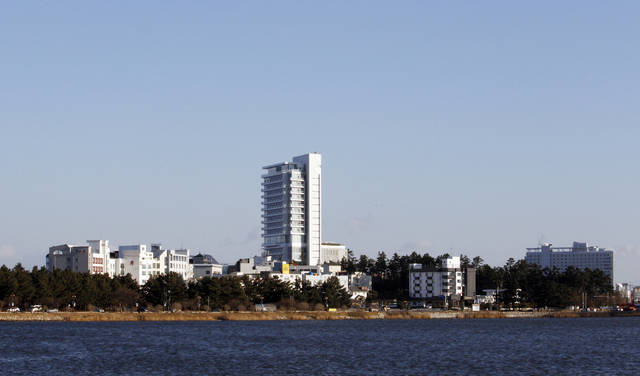
In this Dec. 11, 2017, photo, hotels and motels are seen at the Gyeongpodae beach, Gangneug, South Korea. Just weeks before the Olympics, a culture clash is taking place in Pyeongchang, and it’s only partly about the anticipatory jitters before a swarm of foreigners arrives. There’s a strain of unease as the government, desperate to measure up to an Olympic host city image, pushes for change in an indebted, aging backwater that relies on tourism and fisheries with no real industrial base. (AP Photo/Ahn Young-joon)
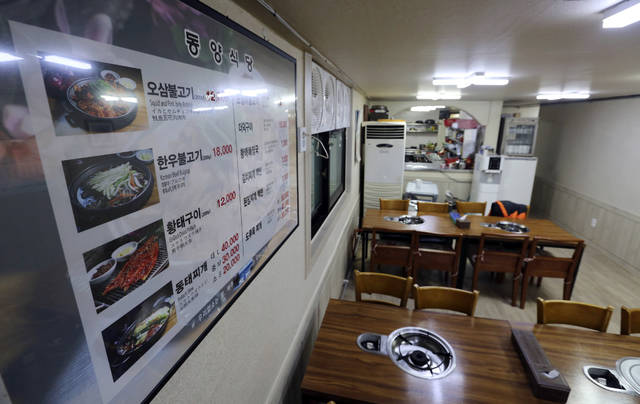
In this Dec. 12, 2017, photo, menus that explained dishes in English, Chinese and Japanese, are seen at a restaurant, in Pyeongchang, South Korea. Just weeks before the Olympics, an unusual culture clash is taking place in Pyeongchang, and it’s only partly about the anticipatory jitters in this remote, mountainous region before a swarm of foreigners arrives. (AP Photo/Ahn Young-joon)
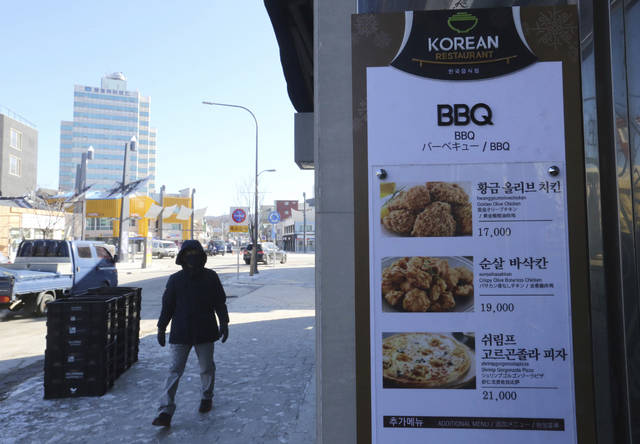
In this Dec. 12, 2017, photo, a man walks by a restaurant with menus that explained dishes in English, Chinese and Japanese in Pyeongchang, South Korea. Just weeks before the Olympics, an unusual culture clash is taking place in Pyeongchang, and it’s only partly about the anticipatory jitters in this remote, mountainous region before a swarm of foreigners arrives. (AP Photo/Ahn Young-joon)
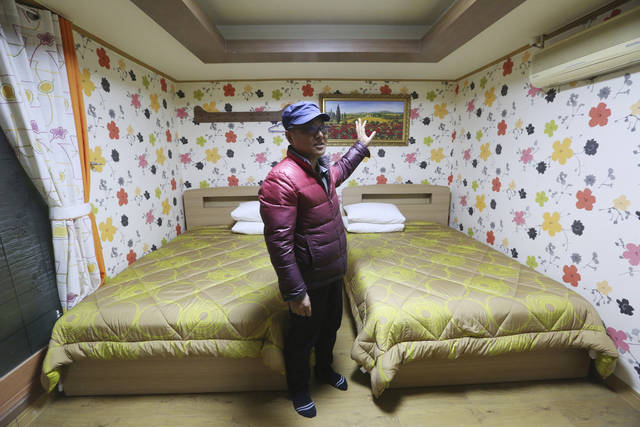
In this Dec. 11, 2017, photo, Shin Jae-kyo, 54, who has owned Green Peace Motel for 13 years, speaks about a renovated room at his motel in Gangneug, South Korea. Just weeks before the Olympics, an unusual culture clash is taking place in Pyeongchang, and it’s only partly about the anticipatory jitters in this remote, mountainous region before a horde of foreigners arrives. He expects his rooms to eventually fill up, and will charge about 300,000 won for his rooms, though right now he’s only about 20 percent occupied for the games, which he and other owners said was common for motels in the area. (AP Photo/Ahn Young-joon)
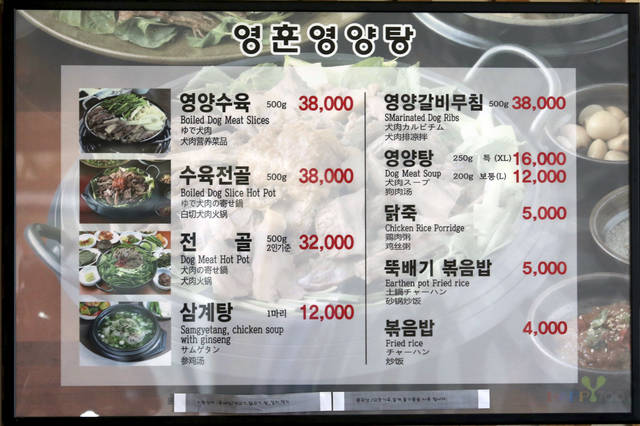
In this Dec. 12, 2017, photo, dog meat menus that explained dishes in English, Chinese and Japanese, are seen at Young Hoon Restaurant, in Pyeongchang, South Korea. Just weeks before the Olympics, a culture clash is taking place in Pyeongchang, and it’s only partly about the anticipatory jitters before a swarm of foreigners arrives. There’s a strain of unease as the government, desperate to measure up to an Olympic host city image, pushes for change in an indebted, aging backwater that relies on tourism and fisheries with no real industrial base. (AP Photo/Ahn Young-joon)
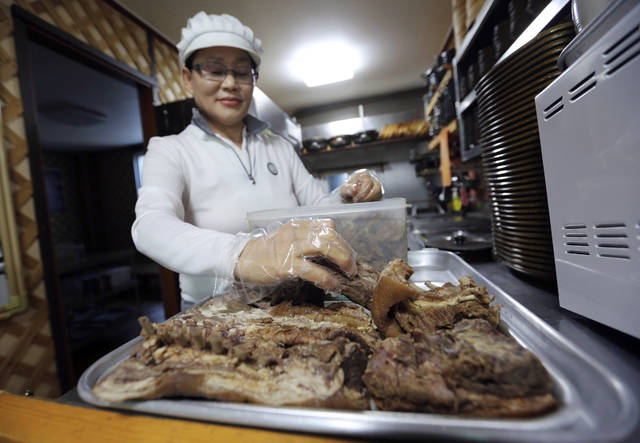
In this Dec. 12, 2017, photo, Park Young-ae, 60, owner of Young Hoon Restaurant, arranges dog meats at her restaurant in Pyeongchang, South Korea. Just weeks before the Olympics, a culture clash is taking place in Pyeongchang, and it’s only partly about the anticipatory jitters before a swarm of foreigners arrives. There’s a strain of unease as the government, desperate to measure up to an Olympic host city image, pushes for change in an indebted, aging backwater that relies on tourism and fisheries with no real industrial base. Park said “I have been selling dog meat for decades. It is really difficult for me to change my menu just because of the Olympics.” (AP Photo/Ahn Young-joon)
PYEONGCHANG, South Korea — Just weeks before the Olympics, an unusual culture clash is taking place in Pyeongchang, and it’s only partly about the anticipatory jitters in this remote, mountainous region before a swarm of foreigners arrives.
PYEONGCHANG, South Korea — Just weeks before the Olympics, an unusual culture clash is taking place in Pyeongchang, and it’s only partly about the anticipatory jitters in this remote, mountainous region before a swarm of foreigners arrives.
Excitement is mixing with a strain of unease as the government, desperate to measure up to an Olympic host city image, pushes for change in an indebted, aging backwater that relies on tourism and fisheries with no real industrial base.
Pyeongchang has always drawn domestic skiers, yet has never had the Olympic scenery of Europe and the West. Efforts to push it that way have shown mixed results.
The government wants Western toilets, beds not pallets in the motels, English-language menus, wheelchair accessibility. Local businesses have taken the plunge, spending their own money on renovations they hope will be long-term investments, but some also grumble there hasn’t been enough official support to do what’s being asked.
Large swaths around the Pyeongchang Olympic Stadium in Hoenggye village look like they’ve sprung up overnight, modern places with English signs and fancy design concepts. New sidewalk bricks are stacked in towers, waiting to be laid over dirt paths. Freshly planted trees line the main streets; new footbridges span frozen streams. Old neon-drenched motels that saw their peak decades ago are being revamped, beds replacing thin futons on the floor.
Officials spent 2 billion won (about $1.8 million) on foreign-language menus and signboards for around 2,000 restaurants. More than 550 restaurants were given about 7 million won ($7,000) each to renovate restrooms and kitchens and switch from floor-seating to Western-friendly tables and chairs. South Korea also spent 6.8 billion won ($6 million) upgrading around 70 public restrooms, and provided simple foreign-language classes for restaurant workers, taxi drivers and volunteers.
But Sim Jae-gook, mayor of Pyeongchang County, expressed worry last year that the efforts were failing to produce “visible results” and pushed for regional officials to redouble their work before the Games start Feb. 9.
In the shadow of the new stadiums, visitors will not have to walk far to find areas that are a far cry from Seoul’s sparkling skyscrapers, myriad restaurants and vibrant nightlife. Many places still have squat toilets and floor seating and sleeping; locals still populate restaurants that specialize in dog meat, dried fish and other local delicacies that aren’t popular in the West.
Some people here wonder why they need to change so much just for a few weeks in February.
Long sensitive to the feeling that for decades they’ve been looked down upon by rich Seoul and have received less than their fair share of the spoils of the country’s incredible rise from poverty to economic power, there’s also suspicion that the official push to renovate is more for outsiders than for locals.
The AP visited the area and spent several days talking with locals to find out how they feel about the biggest thing to happen to their homeland in recent memory. Here’s some of what they said:
———
“WHAT’S THE POINT?”
“Why apply for the government money?” Nam Sun-woo, 60, says, describing her thoughts after she heard a rumor that the road where her fish restaurant sits only a short walk from Olympic Stadium in Hoenggye would be demolished.
“What’s the point of getting disappointed?” she says as she lays out fish on platters before the lunch rush, cast-iron pots and skillets crackling above roaring gas flames on a huge stove, the day’s meals floating in huge tanks nearby.
Her restaurant, like many in the area, relies on local business. Guests sit on thin cushions on the floor at long low tables where small dishes cover every available space: half a dozen types of pungent kimchi and pickled vegetables, fried fish, broiled fish, grilled fish, raw fish.
Her business, and the road, was spared. Though she has little interest in the Olympics, Nam spent about 2 million won ($1,800) of her own money to change the bathrooms from Asian squat style to seated Western style and to replace some creaky sliding doors.
She worried, though, that bringing in chairs and tables would ruin the floors, or turn off her regular customers.
“This place is too old to change,” she says. “I don’t expect to get much money from the Olympics visitors. I have to keep doing what I’ve always done, rely on my local customers and hope it can pull me through.”
———
“A MATTER OF PRIDE”
Many motel owners expected excellent prices for rooms amid rumors that lodging could go as high as $1,000 a night.
“That was our mistake, to think that the prices could be so high because we are only five minutes from the stadium,” says Shin Jae-kyo, 54, who for 13 years has owned Green Peace Motel, in Gangneung, the coastal city where skating, hockey and curling will be staged.
Shin got 7 million won from the government for renovations, but expresses a sentiment many businesses here share: “What can you do for that amount? It takes a couple hundred thousand (dollars) to do it properly.” ”
He said he spent 130 million won ($122,000) on renovations including adding new beds and renovating bathrooms. He flourishes the receipts for all the work, and, during a tour of his rooms, shows off gleaming new porcelain sinks and toilets and shining tile walls and floors.
He expects his rooms to eventually fill up, and will charge about 300,000 won for his rooms, though right now he’s only about 20 percent occupied for the games, which he and other owners said was common for motels in the area.
“If it’s just domestic customers, I don’t need to do this, but I felt it was necessary for the foreigners coming. It’s a matter of pride, to show this area in its best possible light to the world,” he says.
———
“A GAMBLE”
Rumors are swirling in the Gyeongpo Beach area of Gangneung, which is crammed with hotels, restaurants and shops selling dried seafood, seaweed and other ocean delights.
Kim Jung-ah, 43, who owns a Korean BBQ and seafood restaurant, heard that the Russians weren’t coming, that the U.S. team might not participate because of North Korea worries and that ice hockey teams might pull out. “I got a little worried because the ice hockey stadium is right here and the Russians are big fans,” she says.
The Russians are coming, but unable to compete under their national flag because of doping, and there will be hockey teams, just without NHL players; the Americans will also participate.
She heard there was government money to be had but couldn’t find details and missed the deadline for applying.
Even so, because she “heard foreigners were uncomfortable sitting on the floor,” she paid about 10 million won ($9,400) to change about 70 percent of her restaurant from floor seating to chairs and tables. She also hired four or five more workers to help temporarily, including a Chinese woman who can speak a little English. “If people don’t come I could be in trouble,” she says.
She also says she’s “a little mad” because a lot of people in the area couldn’t get government support. “I had to do it all myself, so it’s a bit of a gamble.”
———
“SO FAR AWAY”
“We’re so far away from everything I don’t think many people around here are doing much,” says Ahn Young-ju, 36, the owner of Arirang BBQ restaurant, in Nammyeon, a rural town about 45 minutes from the downhill ski course at the Jeongseon Alpine Center, the only Olympic venue in the area. “I don’t expect the Olympics will help me,” she says.
She didn’t get any government money and isn’t doing any renovations.
The hype over the Olympics, she says, reminds her of the high economic hopes in the area when a casino was built about 10 minutes away. But it quickly became clear that only the places next to the casino would benefit.
There’s worry in the village about the Olympic government debt — and also about talk that people may be staying outside the province and only commuting in for the games. “I felt a little pride because our area was hosting the Olympics, but if people are staying elsewhere and only driving in for the games, it doesn’t make sense. How can somewhere else be part of the Olympics that were given to us?”
———
“UNFAIR”
“I have been selling dog meat for decades. It is really difficult for me to change my menu just because of the Olympics,” says Park Young-ae, 60, whose Young Hoon Restaurant is nearly in the shadow of Olympic stadium.
She registered for government aid several times, but the government said it wouldn’t help unless she stopped selling dog meat because officials told her that “foreigners tend to have stereotypes about” a cuisine still popular in Korea among the elderly. She refused, but she still spent about 7 million won of her own money on new tables, floors and wallpaper.
“Maybe it’s something I should have done for the sake of the Olympics, but I felt too uncomfortable because I’ve been doing this for so long,” she says, just before cracking open a big plastic container of dried dog meat and ribs. “It’s unfair that they don’t give aid to dog meat restaurants but give it to other restaurants.”
———
AP journalists Kim Tong-hyung and Yong Jun Chang contributed to this report.

